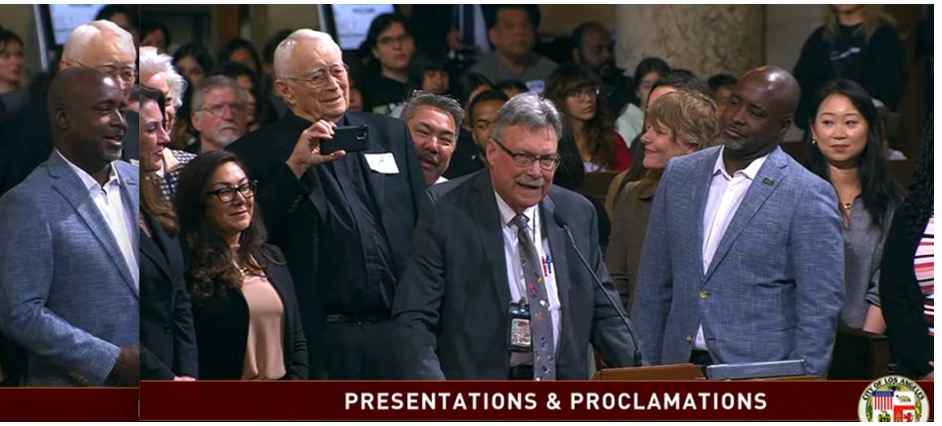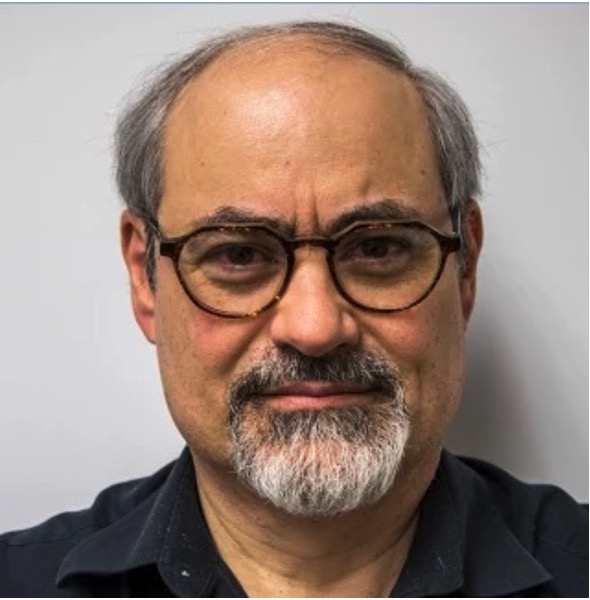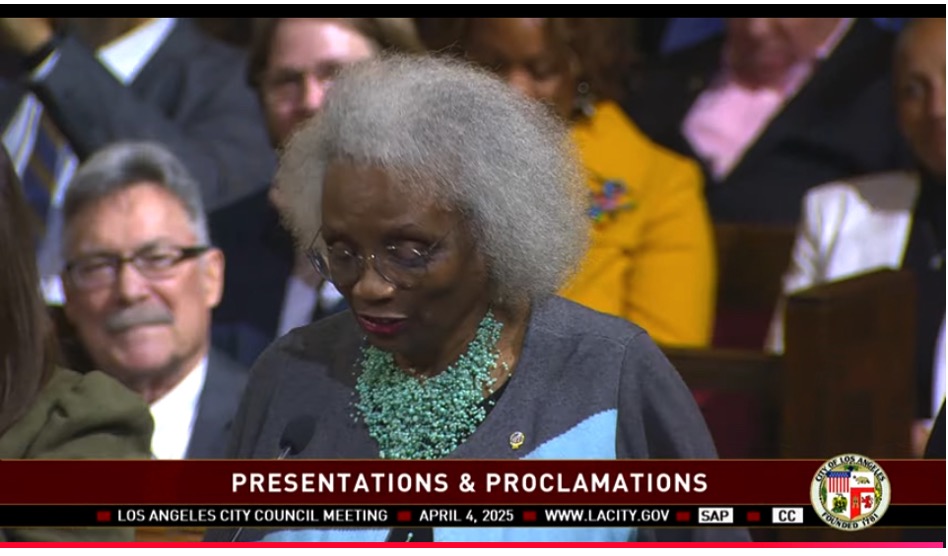Comments
ERIC PREVEN’S NOTEBOOK - On the day the Dodgers and Benjamin Netanyahu showed up—together—at the Trump White House, it's safe to say the optics were not ideal. Especially not coming off a weekend march against Trump that, let’s be honest, barely rattled the windows. (Correct me if I’m wrong, but the passion felt... muted.) Mookie Betts went this time, and some fans aren’t taking it lightly.
Meanwhile, back home in California, Hospitality Zones are reemerging like a late-night bar tab no one remembers ordering. A new wave of sharp young legislators thinks local governments should get to decide whether last call rolls all the way to 4 a.m. Because... the Olympics. And the World Cup. And the Super Bowl. And apparently, public drunkenness is now a legacy strategy?
Smart Speaker: Again, isn’t that a trafficking-rich portfolio of things to be doing?
And then there’s the $4 billion settlement for the atrocities at McClaren Hall that’s not actually going to be $4 billion. Davenport, get in here! It’s going to have to be $1.5 billion, with attorneys capped at a cool 10%—so $150 million. Final offer. Otherwise, good night and good luck spinning it in the court of public opinion, McNicholas et al.

Hungry For Revenue:
EUNISSES HERNANDEZ, CD1: “By charter, we’re not allowed to sell that asphalt… but it could be an opportunity to charge for that asphalt.”
CRAIG FIEGENER, KNX: “Well… how much?”
HERNANDEZ: “Fifty million.”
FIEGENER: “Oh… fifty million.”
([beat])
“But fifty million to a billion... that’s one small chunk. A billion is a thousand million... You’d have to find a lot of little places…”
HERNANDEZ: “I believe the city can… and needs to explore that. Try to find new dollars where dollars haven’t been generated before. For example, we don’t have big fees or fines for big corporations on a lot of projects.”
(Translation: corporations currently get an all-you-can-eat buffet of public infrastructure—no tipping required, but encouraged.)
“For example, take our streets and crumbling sidewalks—people get to use them. And we, the taxpayers, get to fix them.”
FIEGENER: “Are you proposing a tax to use the sidewalks?”
HERNANDEZ: “Well, we’d have to go to the voters with a tax and we don’t have time…”
FIEGENER: They never have time.(Editorial byte. So noted.)
HERNANDEZ:…but there are different permits, fees, and fines that we should look into—to bring them into the 21st century. I’m looking to see how corporations can pay their fair share to make sure that our city has the infrastructure we need… and that they use every day.
City Volunteer:
Smart Speaker: Good morning, Council President Marqueece Harris-Dawson, a chip off the old Herb Wesson block—which is to say, a man perfectly comfortable doing the kind of unspeakable backroom things we’re not supposed to speak about… publicly.

Harris-Dawson is a delegator but helped honor Charlie Rausch from both sides.
Pro Tempore Bob Blumenfield, our resident FEMA-obsessed spreadsheet survivalist, is always ready to reallocate emergency funds before the emergency. Bob, it’s not a flood, it’s just a constituent.
And of course, Assistant Pro Tempore Nithya Raman, who now co-signs letters with the Mayor like it's Model UN. She represents what used to be David Ryu’s district—yes, the same Ryu who politically birthed Esteban Montemayor, who in turn gave us Lindsey Horvath, and for that, Councilmember Raman, history will never forgive you.
Thank you all for pretending—convincingly, at times—that the public’s time and input are valued. It’s hard work appearing interested while ignoring people in real time.
I’ll speak now on Items 1 through 25, plus a few others you tried to quietly slide past us under the “public hearing already held” shuffle.
Let’s talk Item 11, shall we? Nearly $1.7 billion in wastewater bonds. That’s billion with a “B,” like Backroom. You say the public hearing’s been held? Sorry, I wasn’t notified. And that is not my problem. It’s yours. Because what you’re doing is muzzling dissent by burying the conversation in committee, then hiding behind a wooden dais like it's a First Amendment-proof panic room.
And speaking of muzzling—Item 8, the revised Affordable Housing Pipeline. You think we don’t want to weigh in on how you’re “streamlining” the rules for who gets what in our housing crisis? We do. So here’s the comment you didn’t want: This revision smells like it was written by a lobbyist holding a golden shovel, standing on the ruins of a rent-controlled apartment complex.
You can’t just say “no comment” and expect silence because we have a Constitution. It’s old, but it works. It says we get to speak, especially about Neglect—the ‘n’ word—and Corruption—the ‘c’ word. These are protected categories of truth-telling, and your efforts to scrub them from public discourse are not just offensive—they’re unconstitutional.
So go ahead and ring the bell, Mr. President. I’ll keep talking until I’m physically escorted out or you admit that you don’t actually want an informed public. You want a docile one.
And now, Prince Spaghetti Day—Wednesday’s agenda.
Ah yes, the Tourism Marketing District. A perfect way to redistribute hotel money into “Visit LA” photo shoots featuring beaches that are mostly closed and a housing crisis that’s fully open. Who are we marketing this city to, exactly? Billionaires? Influencers with burner apartments? The ghost of Tom Bradley?
And Item 9, the Fourth Construction Report—what a majestic term for what is essentially creative accounting. We move MICLA money from pot to pot like it’s a shell game, and the pea is accountability. Missing, again.
General public comment? Here it is:
You are legally required to let us speak. And I’m not here to entertain you—I’m here to remind you that democracy is not supposed to feel like booking an appointment at the DMV while blindfolded. When you reduce public comment to a procedural speed bump, you’re not leading—you’re managing decay.
So if you’re not going to lead, fine. But don’t ask us to be polite while you do it. And don’t call security when the public brings up uncomfortable truths—like how many times you’ve used “urgency” to push through luxury projects, or how often your “transparency” looks like a fog machine at a ribbon-cutting.
We’re not going away.
We’re paying attention.
We’re reading the fine print.
We’re showing up.
Because someone has to.
And for the record—First Amendment. Look it up.
Thank you.
County Volunteer:
Smart Speaker: Good morning, Supervisors. Eric Preven — volunteer. Recognized by no one, compensated by no one, but here nonetheless. Because it’s Volunteer Month in Los Angeles County, and as the proclamation says, the County couldn’t do what it does without volunteers. You're welcome.
So in that spirit of gratitude, I want to thank the Board for honoring people like me — folks who donate their time to ask extremely awkward questions about emergency contracts, legal settlements, and revolving-door real estate deals that somehow all circle back to Mark Ridley-Thomas.
Let’s start light.
Item 32-B — thank you for the Volunteer Month recognition. It means a lot. It almost makes up for the fact that in 2024, volunteers like me contributed the equivalent of $58.6 million in unpaid labor, just to keep up with your agendas.
We’ve got Items 14 and 21 — authorizing emergency contracts without competitive bidding. Again. Still. For wind and fire damage that occurred in January. It’s April. At some point, if the same contractor keeps winning the no-bid contract, it stops being an emergency and starts being a business model.
Then we’ve got Items 26 through 29 — settlements, all involving the Sheriff. Four cases. $4 million. I mean, I don’t want to call it routine, but I’d suggest printing the checks in advance, just to save time.
Item 4 — a $3 million injection to Catalina Island Health. I’m sure it’s needed. But to the rest of the County, it feels like you’re personally escorting the IV drip to Avalon while LA General is holding bake sales for gauze.
And now, let’s get to Item 7 — the Expo/Crenshaw Station site.
At first glance, this looked familiar. A little too familiar. A mixed-use project at a Metro station? Joint development with the County? A newly formed LLC with a nice generic name — Expo Crenshaw Apartments II, LP?
Huh. Sounds shiny and new.
But it’s not. It’s the same project — or should I say, the same deal — that was awarded during the Ridley-Thomas years. And when I poked around, guess who I found still working on it?
Richard Bruckner.
The former head of LA County Regional Planning, now with Mayer Brown, advising the developers. The same Richard Bruckner who, months after leaving County service, was showing up on this very Board floor, advocating for this project on behalf of Watt Companies — in violation of the County’s own one-year lobbying ban.
Now, you may recall, I reported that at the time. I included documentation. The Public Integrity Division gave it their best effort — by which I mean, they ignored it.
And now, years later, the project is still alive — just under a different name. The cast of characters? Mostly the same. The consultant? Still there. The developer? Possibly still Watt, just with better legal camouflage. The smell? Unmistakable.
And yes, Ridley-Thomas is appealing his conviction. But while we wait for the 9th Circuit to decide whether MRT walks or reports to prison, his fingerprints are still on your agenda. Literally. You’ve renamed the deal, but the ink is still wet.
So — respectfully — when I see glossy proclamations about public service and transparency, while you’re approving millions in no-bid contracts, quiet settlements, and recycled deals wrapped in new LLCs, I just want to offer a volunteer’s perspective:
It’s not personal. It’s procedural. But it’s also pattern recognition.
And lastly, thank you for inviting the City Councilmembers last week. It was lovely to hear their voices. Could we now ask them, nicely, to let the public call in again? Could you send a five-signature letter urging them to restore public comment by phone?
Because as a volunteer, I’d love to keep helping.
SLAPP-Happy Justice in California
California’s anti-SLAPP law was designed to protect people like me. People who speak out about public corruption, waste, abuse. But lately, it’s doing the opposite—empowering the powerful, gagging the truth, and burning down real justice in the name of “free speech.”
Let’s start with the fairy tale ending. Joy Freiberg, an animal welfare volunteer, blew the whistle on mismanagement and cruelty inside LA’s animal shelters. Larry Gross, a Garcetti-Bass appointee and longtime City Hall mascot, sued her for defamation. Freiberg, with help from First Amendment attorney Paul Nicholas Boylan, filed an anti-SLAPP motion and won. The court agreed it was a bogus lawsuit designed to silence her, and Gross was ordered to pay nearly $74,000 to Boylan.

Paul Nicholas Boylan.
Cue the confetti.
But here’s the turn: Boylan, who was rightly celebrated by Dan Guss for defending Freiberg, also took $100,000 to help me enforce a hard-won judgment against a public agency—then disappeared when it came time to finish the job. He got the glory. I got stiffed. Taxpayers? Still waiting on a refund.

Olivia Mitchell with Charlie Rausch in bg. The public is never seen.
Then there’s Isaacson v. Leibreich. A truly disturbing case involving serious abuse, harassment, and evidence that would make any HOA blush. Isaacson brought it to court. The judge granted a temporary restraining order—then things took a turn. Using the anti-SLAPP statute, the court penalized Isaacson and blocked her from bringing the full scope of the Leibreich atrocities from the TRO court into civil court. The law didn’t protect her. It erased her.
So what happened?
Anti-SLAPP, once a shield against legal bullying, is now being used as a blunt instrument to silence uncomfortable truths. It favors legal precision over moral clarity. It rewards those who speak strategically, not honestly.
And now, the City of Los Angeles is invoking the same statute after it accidentally released the names and photos of undercover LAPD officers in a botched public records settlement. The defense? That the release was part of protected “speech.” If bureaucratic incompetence is now a First Amendment act, we’ve officially lost the plot.
Even Justice Kathryn Werdegar of the California Supreme Court warned: “The anti-SLAPP statute was never intended to permit defendants to abuse the statute through motions to strike that lack even minimal merit.” But that’s exactly where we are—especially in the hands of lawyers who know how to win procedurally and vanish ethically.
So no, the law as it stands isn’t good. The idea behind it is. But when the statute protects the officials who messed up, silences the residents who were right, and lines the pockets of lawyers who vanish mid-victory, that’s not justice.
(Eric Preven is a Studio City-based TV writer-producer, award-winning journalist, and longtime community activist who won two landmark open government cases in California.)








